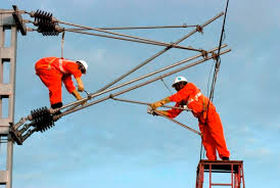Baltic States – CIS, Cargo, Construction, Energy, Latvia, Railways, Technology, Transport
International Internet Magazine. Baltic States news & analytics
Friday, 26.04.2024, 04:27
Government may have to provide EUR 100 mln co-financing for rail electrification project
 Print version
Print version |
|---|
According to Berzins, the first round of the project will be allotted EUR 347 mln from the European Union's Cohesion Fund, Latvijas Dzelzcels will borrow EUR 100 mln from the European Bank for Reconstruction and Development, and the state will have to provide another EUR 100 mln.
According to Latvijas Dzelzcels' proposal, EUR 100 mln more should be invested in the company's share capital. This is yet to be discussed with the European Union, said Berzins.
Work is continuing to achieve that financing scheme for the project has as little impact on the budget as possible, said Berzins. The project is an investment in infrastructure that will create new profit opportunities for the state in the future, he emphasized.
As reported, Prime Minister Maris Kucinskis (Greens/Farmers) is skeptical about the rail electrification project, underscoring that additional information should be obtained about this plan. "In order to discuss possible support to the electrification project, it is necessary to obtain additional information and draw estimates," the prime minister's spokesman Andrejs Vaivars said.
LETA also reported, during the first stage of the project from 2019 to 2023, the Daugavpils-Krustpils line and the Rezekne-Krustpils line on the route to Ventspils will be electrified. The total cost of the first stage is EUR 660 mln.
Meanwhile, during the second stage of the project between 2020 and 2025, the Krustpils-Skirotava and Daugavpils-Indra lines on the route to Riga will be electrified, with a total cost of EUR 519 mln.
EUR 347 mln worth of EU cohesion funding have been made available for this project for the EU's 2014 to 2020 planning period.
The cost-benefit analysis conducted by Ernst&Young Baltic concluded that the project will have a positive impact on the environment and the national economy.








 «The Baltic Course» Is Sold and Stays in Business!
«The Baltic Course» Is Sold and Stays in Business!

